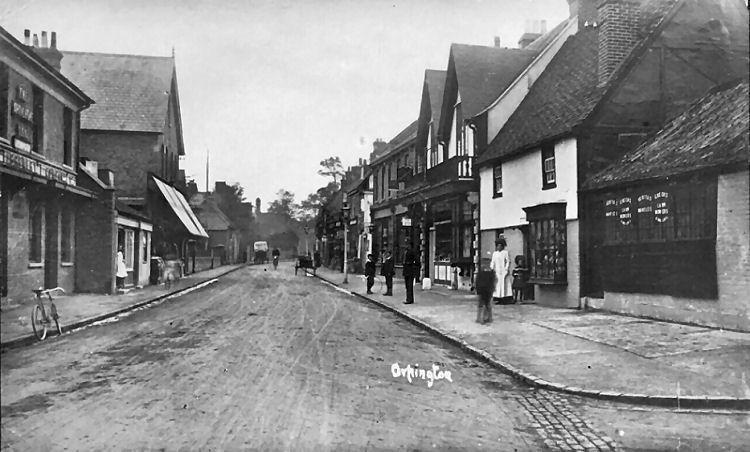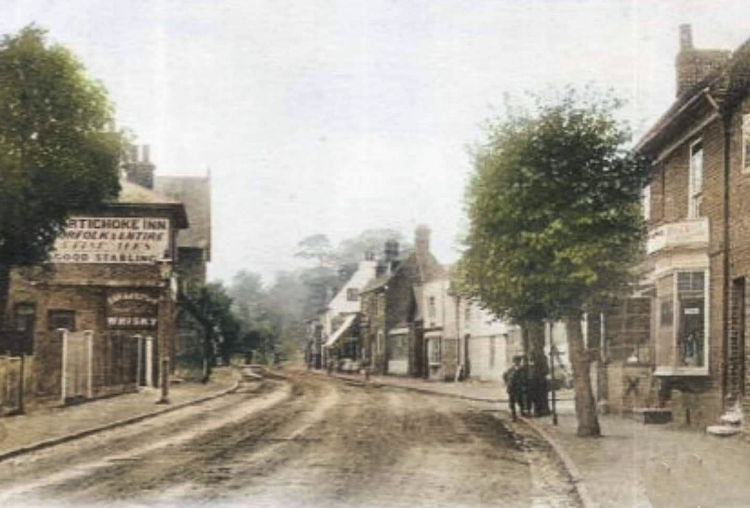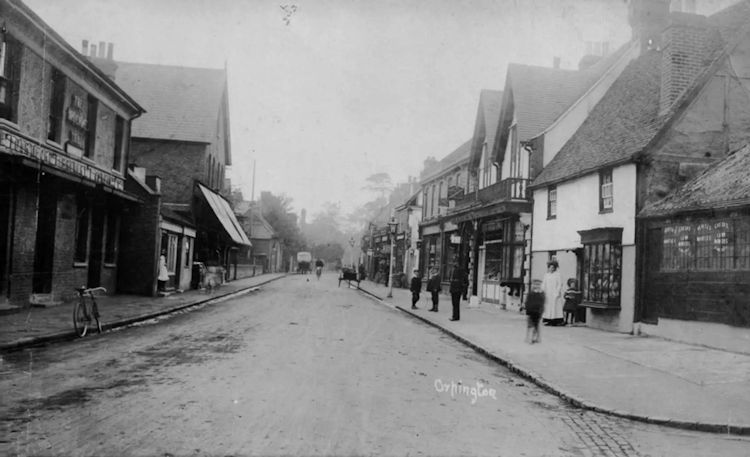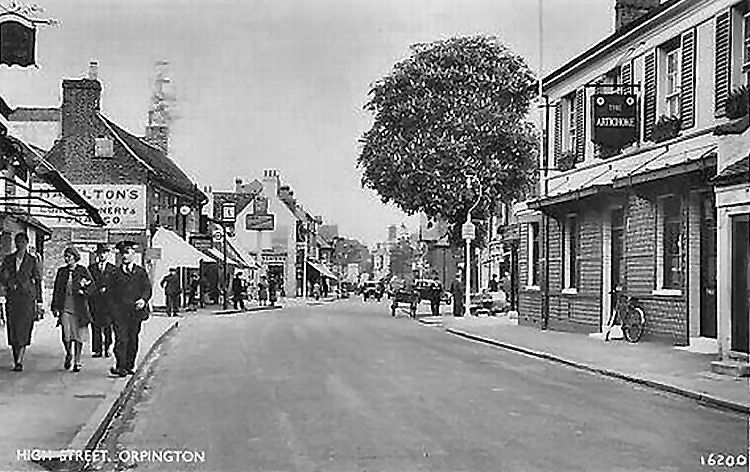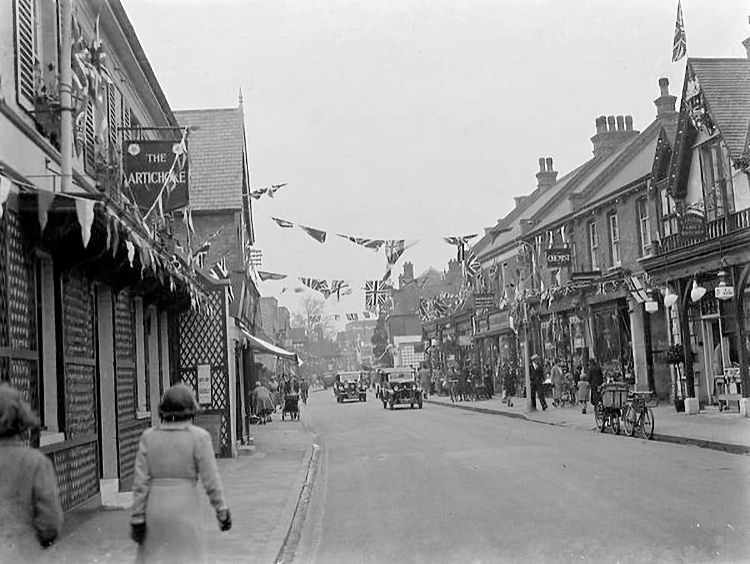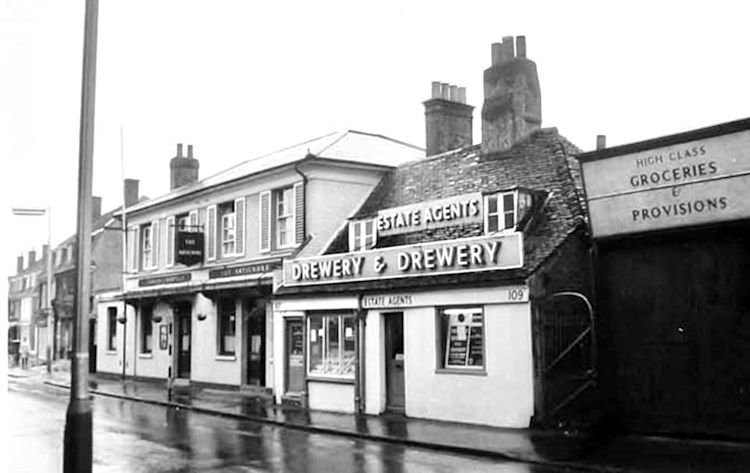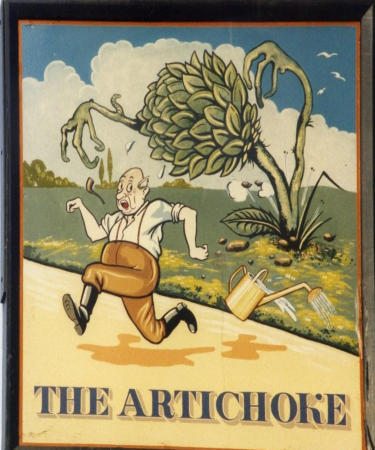|
Maidstone Journal and Kentish Advertiser, Monday 19 December 1864.
The most important place in the calendar was that of two men charged on
a verdict of the coroner's jury with the wilful murder of
a man named Caleb Fisher. They were committed by the magistrates for
manslaughter, there being a difference between the course
taken by the coroner's jury and that taken by the magistrates. But he
would tell them they had nothing to do with the verdict of the
coroner's jury; and they were no doubt aware that if they returned a
true bill for wilful murder the men could be acquitted of that
charge by the petty jury, and proceeded against on the lesser charge of
manslaughter. If, however, they were satisfied that it was
only a case of manslaughter, it would be quite right for them to return
a true bill to that effect, notwithstanding the decision of the
coroner's jury. The circumstances of the case were involved in
considerable obscurity. He would not take it up in the order in
which it occurred; but would just mention that Caleb or James Fisher
died on the 29th of last November. On Saturday, the 19th,
at a late hour, he was at a public house called the "Artichoke," and he
was afterwards found by two policeman named Jones and
Beeson lying on the ground in a state of insensibility, covered with
blood, and with a wound on the head, and near the eye. A
medical man was sent for, but Fisher never recovered, and on the Sunday
night he died. When the policeman went up to him - one
constable being a little in advance of the other - they found the two
men with him who were now awaiting their trial. One of them
was holding him by the neck, and the other by the legs, and were thus
clearly found in contact with the deceased. They were not,
however, seen to do anything that would account for death. They were
clearly seen in contact with the deceased, but no blows
were seen struck. It was, therefore, necessary for him to refer to the
earlier transactions connected with the affair. It appeared the
parties were at the public house drinking; but according to the evidence
it appeared they were not so drunk but that they could
walk. A dispute arose just outside the "Artichoke" about the deceased
having affirmed that he had worked on the railway 15 years
ago. One of the party denied the truth of that statement, saying it was
false, and using a bad expression. Upon that the deceased
said he would "give it to him," and something like a blow was struck. At
this stage of the affair the policeman very properly
interfered, when one of the party proceeded to take off his jacket, the
police remarking that if they did not desist they would be
taken into custody. Deceased then said "Good night," and walked away in
the direction of his home. The two prisoners according
to the evidence, remained for about 2 minutes, and then walked down the
lane in the same direction as that taken by the deceased.
They walked slowly at first; but according to the opinion of the police
they must have gone on very fast after they got about 20
yards away from them. The policeman follows the men; and when they had
got some distance down the lane they heard cries, and
before they got up to the men they heard a person say "Get up," using a
very coarse expression, which was repeated two or three
times. When they got up to the men they found one had hold of the neck
of deceased, and the other the legs.
If, therefore, they were satisfied that there was provocation, and that
a repetition of what had taken place, and that death resulted
from it, they might safely reduce the charge to manslaughter; but unless
they could see their way clear to that conclusion, they
must return a true bill for the greater crime.
The Orpington murder.
Edward William Staples, 23, labourer, and James Turner, 26, labourer,
were indicted for the wilful murder of Caleb, alias James
Fisher, at Orpington, on the 20th of November. They were indicted on a
second count for the manslaughter of the said Caleb
Fisher.
Mr. Addison said this case arose out of one of those unfortunate
quarrels caused by drink. Prisoners and deceased were drinking at
the "Artichoke," at Orpington, and the jury would have to consider what
took place after they left the house. In the house deceased
insisted upon it that he had been employed on the railway 15 years ago.
Turner said it was false, and shortly afterwards hit him,
when Staples interfered. Ultimately Fisher left the house, but, no doubt
before that he struck Turner in self-defence. Defendant
went in the direction of his house, but whether or not that was also in
the direction of prisoners homes would probably come out
in evidence. Prisoners followed shortly after, at first slowly, but
afterwards quickly, two policemen going after them. The
deceased was found with the prisoners, and was suffering from either
blows or a fall, which proved fatal. After some further
remarks from the learned counsel, the following evidence was taken:-
Emmanuel Jeal:- I am a brother-in-law of deceased, who died at 10:30 on
Sunday night.
Bye Mr. Ripton:- I had known Staples 11 years. He lived in Sprat's
Corner. He is a labourer. I was not in the habit of seeing much
of Staples. I do not know anything of the other man. The way in which
deceased went was his direct way. It was moonlight at the
time. There were perhaps 20 houses from the public house to where
deceased lived.
By his Lordship:- From the "Artichoke" the road is straight without any
crossing at all.
William Saker:- I live in Orpington, and remember being at the
"Artichoke" on the Saturday night. The deceased was there with me
for a short time, besides two other men. We were all drinking together.
This was about 10:30. We remained there drinking till ten
minutes before twelve. Turner was in the house, but I did not notice
Staples there. I heard the deceased speaking about working on
the rail about 15 years ago. The conversation was noisy. After that we
all turned out. When I got outside the house I saw Staples
for the first time. I heard Turner speak to deceased, and deceased hit
him with his hand on the head, and knocked off his hat. The
policemen, Jones and Beeson, came forward and told Fisher to go home.
The deceased and Turner appeared to be tipsy. Staples
did not appear so bad. Deceased went straight up the road towards his
home. Staples said, "I don't like to see my mate served like
that," and took off his jacket. I left the prisoners standing there, and
my two companions went with me.
By Mr. Ribton:- I went quite the opposite way to the prisoners. Spratt's
Bottom, I should judge, is about 3 miles from the
"Artichoke." We all left at the time of closing. They were all going
away when I left. Most of those at the public house were
labouring men. I don't know in which direction most of them went. I did
not talk with any other person but the deceased and my
two companions. Deceased was talking to several men. He did not appear
much the worse for liquor.
Mr. Ribton:- But you said different.
Witness:- He was the worse. He, however, walked straight up the road. I
remained there two or three minutes, and then started and
left the party. The road is a good one, and there is a footpath on each
side, raised higher than the road. There is no kerb stone.
By his Lordship:- You can get the way Fisher went to Spratt's Bottom.
John Crawford:- I was drinking with deceased and last witness at the
"Artichoke," and heard words between deceased and
deceased and Turner. Fisher said he worked on the rail 15 years ago.
Turner said he did not believe it. They then went outside.
When I got outside there might have been a dozen with them. Deceased
repeated that he worked on the railway 15 years ago, when
Turner said it was false. Deceased said, "If you say that again, I will
hit you." He did, and deceased hit Turner, and knocked his cap
off. Staples was standing on the stone, by the side of the inn. Deceased
pushed Turner with his hand. Staples said "If he had done it
to me, I should return it." I did not see Staples do anything. The
policeman recommended deceased to go home, and he walked
away up the road. The two prisoners followed about five minutes
afterwards. I went home, and saw no more.
By Mr. Ribton:- I and Saker stood in front of the house four or five
minutes, and then went home ourselves. When we started
prisoners started also. I did not notice who came in and who went out
within a short time of closing. I can't tell how many. What
road they took after they left I don't know. As far as I heard, deceased
only spoke to Turner about the railway.
Richard Jones, K.C.C.:- I was on duty on the 19th of November, in front
of the "Artichoke," a little before twelve. I saw the house
closed and the people turned out. I saw deceased and the two prisoners
depart. I heard deceased say that he works on the line 15
years ago. Turner said it was false. Deceased said, "If you say that
again I will hit you." Deceased went up to Turner and pushed
him. I did not observe whether Turner's hat or cap fell off. My brother
Constable requested the prisoner and deceased to go home.
Staples was on the path. After deceased pushed Turner, Staple said, "I
would not stand that," and "He was half an Irishman to let
him do it." Turner made an attempt to pull off his coat, and got it
partly off. All three men did not appear under the influence of
drink. Deceased bade us good night, and walked away for home. After a
minute or two the prisoners sauntered in the same
direction for about 20 yards. I then saw them quicken their pace, and my
brother Constable was with me about that time. We then
followed them, and after we got about 100 or 150 yards, we heard the two
men cry "get up" several times. It was five or six
minutes after the prisoners left before we got up to them. When we heard
the cry we ran till we came up to them at Mayfield Gate,
and 250 yards from the public house. I knew the two voices were the same
as I had heard outside the "Artichoke." When we got
up to them we saw Turner with his arms under the deceased to raise him
up. Staples was looking at his legs. I then turned my
light, when I saw deceased had been struck, and blood was coming from
his face. I saw two pools of blood about two yards from
deceased, who was lying across the road. I asked, "What game do you call
this? Turner remarked that deceased had had a fall. I
told them it was no fall; it was a blow. I pointed out to them that the
man was lying in an insensible state, and might probably not
recover. I told them they had been ill-using deceased, and charged them
with the offence. We then got deceased up and washed his
face. I saw they had heavy shoes on.
By Mr. Ribton:- There was a wall on the right hand side from the
"Artichoke." Deceased was lying about five or six yards from the
wall. Deceased inclined to the left hand side. There are two houses on
that side. I called at a man's house and asked if he could
lend us a cart, and he got one. Deceased's head was towards the wall and
his feet towards the fence. The blood was towards the
fence, close to the footpath. If he had been lying down his head would
have been about a yard or a yard and a half from the
footpath. I had been walking down Orpington since ten o'clock. The
public house was in the centre of the village. I saw Saker,
Croffer, and Whiting outside the public house. I saw them go all
together, and prisoner went away in another direction.
Re-examined by Mr. Addison:- The blood was six or seven yards from the
wall.
Joseph Beeson, K.C.C.:- I and the previous witness went up together. I
saw the deceased and the prisoners in front of the
"Artichoke." Deceased said he had worked on the railway 15 years ago,
which was denied, when Fisher struck a blow. I said,
"Fisher, you had better go home; you will get locked up." He replied,
"So I will Mr. Beeson; good night." He then went straight up
the middle of the road. He was not what I call drunk - he could walk
straight. The other two men stood there about three minutes,
when they walked in the same direction at a slow pace; but after they
got 20 or 30 yards off they started faster. At the time
deceased pushed Turner, Staples was on the footpath. Staples said to
Turner, "If he had hit me like that I should have hit him
again." When they started off we followed them. We came up to them
opposite Mayfield Gate. We got up to them in about three
minutes. After we got about 150 yards we heard the prisoners saying "Get
up," which was repeated three times. The expression
was used by two voices. I can't swear to the two voices. I saw deceased
in the road. Turner was behind him, with his arms around
him. Staples was by his legs. I heard my brother Constable say, "What
game do you call that?" One of the men said, "He has had a
good fall." I said, "I will lock you up; you've been ill-using him."
They both said, "Do you think we should do such a thing as
that?" The man's face was covered with blood and dirt. The blood ran
from his eyes and nose, and he was quite insensible. I saw
the blood on the road. I fetched the water and washed his face.
By Mr Ribton:- The prisoners both said with oaths there and going to the
station, "Do you think we should do such a thing as
that?" There were two pools of blood. The man's face was also dirty. I
did not notice whether his clothes were dirty. I did not see
deceased strike Turner, nor notice his hat fall off. I did not notice
it.
Frederick Batcher Fullcher, surgeon:- I remember being called to see the
deceased on the Sunday morning. I went to the Mayfield
Gate. He was lying against the wall. He was perfectly insensible. Police
constable Jones and Beeson and several others were there.
I found deceased very cold, his limbs stiff and rigid, and his pulse
low. I saw a bulging on the left eye, which was bleeding. I
bandaged him and got him home, and he was put to bed. My opinion from
the first, was that he would die. He never rallied, and
died on a Sunday evening, about 10:30. I observed two pools of blood on
the road. At the post mortem examination externally
there were some slight scratches on the face not injurious to life. I
found the internal parts all healthy excepting the head. Internally
we saw there was a fracture of the lower jaw. After we move the skull we
found a fracture on the inner table of the right frontal
bone, about an inch and a quarter in length, extending upwards. The
surface of the brain was covered with blood. The blood
vessels was suffused with blood, producing pressure on the brain. Those
injuries might have been caused by one blow, but I think
not. The injury on the jaw might have been inflicted by a man's fist.
The blow on the skull might have been inflicted by some blunt
instrument while deceased was down. One blow could not have produced all
those injuries.
By Mr. Ribton:- I don't believe a blow could have produced that.
Supposing he fell and struck his head against the wall, there
would have been an external injury.
Mr. Eagleheart assisted the last witness in his post-mortem examination.
He observed the injury to the orbit of the eye and the
fracture of the jaw. The ball of the eye was uninjured. He was of
opinion that the injury to the eye might be caused by a kick. All
the injuries might have been produced by a kick, but not all by the
fist.
By Mr. Ribton:- My opinion is unless from a very great height a fall
would not cause it. From the state of the brain I should not
think that he was drunk. The side of the brain where the injury was was
very much congested; the other side was healthy. It is
possible that he might appear more intoxicated after he left the house
then before. I think it is probable the blood came from his
nose and mouth. I have seen many larger pools of blood from the nose.
Joseph Powell, sergeant in the Rochester police force, said the boots of
both prisoners had tips and nails.
Police constable Beeson, recalled, said he knew nothing against Staples,
and he knew that he lived at Spratt's Bottom. Deceased
used to dance and sing for beer.
By Mr. Addison:- I never knew him to be quarrelsome.
Mr. Ribton, in defence, said he should confine himself to answering the
charge of manslaughter. It was a painful case in regard to
the prisoners. Staples was of a very respectable family. He was careful,
industrious, and attentive to his work, and Turner was not
so well known, being a Herefordshire man, and lodged at Staples' house.
He would submit that it was not proved that either of the
men were the cause of his death, for it might be other persons were
mixed up in the affray. The prisoners were found near the
deceased, but what occurred from the time the man left the public house
to the time when he was found they could not tell. Now
it was perfectly clear that the injury the jury were left to draw an
inference from the facts. He could not call it circumstantial
evidence, because much would point to the same conclusion - the
prisoners coming from where the murder was committed, and
lots of blood on their clothes. But the facts themselves did not point
to the prisoners except in a very unsatisfactory way. He
would point out what he considered to be a very important point namely,
the interval of time between leaving of the deceased and
the starting of the prisoners. Some of the witnesses said it was four or
five minutes. One of the Constable said one or two
minutes; and he thought some time lapse, probably five minutes, after
Fisher left before the prisoners left. They did not follow
him, but were going into their own homes. If four or five minutes elapsed
before they started, Fisher would have got some 200
yards ahead of them. Even supposing Fisher left four or five minutes
before them, he would probably have arrived at the gate
before they started. He next called their attention to the fact that
near the very place where the man was found there was a
"navvies" house. Deceased might have been insulting or insolent to
others beside the prisoners - perhaps the navies - and have
come by his death in that way. The Constables were, of course, set to
find out the perpetrators of the crime, and it invariably
happened that they turned their attention in one direction. Supposing
that the body of the deceased had been found only the next
morning, the police would certainly have in the first instant suspected
the prisoners; but they would have gone, for instance, to the
navies and measured their boots. How far could a man walk in five
minutes? 200 yards would be a reasonable distance. It was
important for the jury to recollect that the policeman heard the
prisoners ask the man to get up, which they would not have done if
they had done him any harm. If they have meant any harm they would have
said something to him in the first instance when he
started. The learning counsel then referred to the medical evidence. One
of the medical witnesses said that the blow near the eye
must have been caused by his fall, and he did not think the blow was
caused while he was standing. He would say that if two large
pools of blood came from the nose, there must have been a considerable
lapse of time. If it was so, the far more reasonable and
probable hypothesis was that some other person inflicted the injury, and
one to whom he had been insulting; and there have been
that doubt the jury must acquit the prisoners of the charge. He said the
pool of blood could not possibly be caused from the nose.
If it were from the eye they must have moved him. Besides, the prisoners
were just in the position they would be found if they
intend administering relief. They went and called out to him; but if
they committed the injury why call out. Why would they not
run away? He thought the statement of the prisoners which they had made
before the magistrates was more probable than that set
up by the prosecution. He asked them not to exclude or sympathetic
feelings towards the families of the prisoners; but take the
view he gave to the prisoners conduct. He then stated that he differed
from his learning friend's statement of the law, that if both
were animated by a common desire to commit an unlawful act both would be
guilty of manslaughter. But if they had used the
expression "let us follow him," or had gone out of the direction of
their own homes, it would been clear against them. In criminal
cases they must be reasonable satisfied that they were treading on firm
ground, or leave it altogether, especially as by our law the
mouths of the prisoners were stopped. If there were no design between
the parties, they would say that the injuries were inflicted
by one or two? If by one, who would they select? Would they select
Turner? Why? Because he called deceased a liar? Or say
Staples, because he made use of the other expression? Would they, rather
than let a guilty man escape, punish both? Surely not. He
assumed that if both had started from the house for the purpose of
getting an apology, and one had inflicted the injury, both would
not be guilty. He then called for his defence Eliza Staples:- I live at
Spratt's Bottom. The prisoner Staples has lived at home all his
life. There are two brothers. He is quiet and inoffensive, and is
unmarried. I have known Turner five or six months, and could not
speak against him.
Joseph Bokes:- I am a navy, and lodge at Staples' father's house. Turner
comes from Herefordshire, and is a respectable man.
The learned Judge then summed up. There were some circumstances in the
evidence which did not admit of any reasonable doubt.
He then recapitulated the evidence, dwelling on the fact that the brain
on the side opposite the locality where the blow was struck
was healthy, showing that deceased was not affected by drink. They would
have to satisfy themselves whether the deceased was in
a state of insensibility at the time the prisoners came up, or whether
he came by his death from the violence of the prisoners, or by
accident, such as a fall, or by a blow given by some other person. If it
were the latter, the prisoners had nothing at all to do with it.
Both of medical witnesses said the bruises were not the result of a
fall.
The jury, after three minutes' deliberation, found both prisoners guilty
of manslaughter, but recommended them to mercy.
Five years' penal servitude.
|
